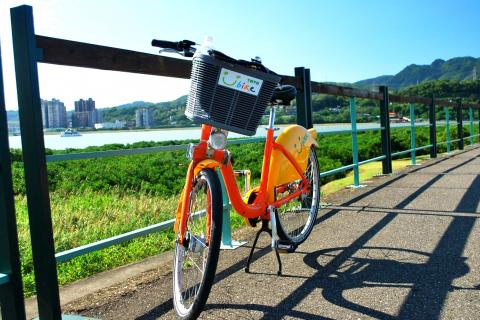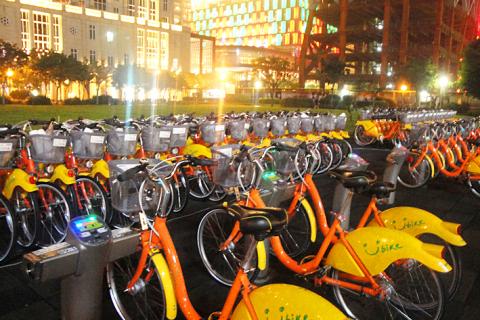Walking into bowels of Taipei’s Mass Rapid Transit system for the first time can be a bewildering experience. The same can be said about the Taipei City Government’s highly ambitious Youbike bicycle sharing system. But once you’ve signed up, used the service once or twice and figured out where the stations are, Youbike is a breeze.
Since Youbike stations are popping up all over the city, the Taipei Times wanted to get some feedback from users. There are two ways to get started with Youbike — EasyCard or credit card. If you already have an EasyCard, simply go to the Web site (www.youbike.com.tw/home.php) and click on the member icon. After following the instructions in English or Chinese, an SMS is sent to your mobile phone for confirmation and you can head directly to any of the stations to use a Youbike. The first 30 minutes of every rental are free and every 30 minutes after that is NT$10.
On the road

Photos: Marcus Aurelius and Lindsey Leamen
Using a credit card should be even easier, since all riders have to do is go to a Youbike kiosk and flash the credit card (as long as it has a microchip) and pick a bicycle. However, the credit card service is only available at 31 out of the 41 stations (mostly in the Xinyi District, 信義), and this is only marked on the physical map, not the one on the Youbike Web site.
Kate Lin (林雅婷) learned about Youbike from her co-worker and now uses the service at least twice a week.
“I enjoy doing this because I don’t get much chance to exercise during the week,” Lin said. “Also, there’s only one bus I can take home, and sometimes I have to wait a long time for it. Riding Youbike [home from work] is faster than that.”

Photo: Marcus Aurelius and Lindsey Leamen
Lin isn’t completely satisfied, though. “The registration machine at the station nearest my house is always broken,” she said. “Also, one time I couldn’t find any vacant places to return the bike, so I could only wait there until someone came to rent another bike.”
Lindsey Leamen, who prefers using the bikes for longer trips, thinks the service could be improved by adding more stations in places that aren’t in the main areas of the city.
“I work in Neihu and would love to have the option of biking to work in nice weather, and then taking the MRT home if the weather turns bad, which is a common occurrence in Taipei.”
Convenient service
Overall, Leamen believes the service is convenient because it provides a list of stations, a real time listing of how many bikes are there at that particular time and how many empty spaces are available.
“The first time I used a bike, I borrowed it for three and a half hours and it only cost me NT$60. That’s amazing, especially considering there’s a similar bike share program in Toronto and for half the time I ended up getting charged the equivalent of NT$700. Oh, and I love the baskets!”
Alex Trup, an avid Youbike rider, thinks it has a lot of potential. “It is very well-priced and if you are a light user, you will rarely pay anything,” he said. “I even made it once from Taipei City Hall to Academia Sinica in Nangang within the free time.”
Youbike hasn’t expanded to where Trup lives yet, but he still believes the service will improve. “Taipei is a great city for cycling because it has plenty of paths, generally flat terrain, and on some days, gorgeous weather. YouBike will solidify Taipei’s position as one of the world’s greatest cities for cycling.”

Taiwanese chip-making giant Taiwan Semiconductor Manufacturing Co (TSMC) plans to invest a whopping US$100 billion in the US, after US President Donald Trump threatened to slap tariffs on overseas-made chips. TSMC is the world’s biggest maker of the critical technology that has become the lifeblood of the global economy. This week’s announcement takes the total amount TSMC has pledged to invest in the US to US$165 billion, which the company says is the “largest single foreign direct investment in US history.” It follows Trump’s accusations that Taiwan stole the US chip industry and his threats to impose tariffs of up to 100 percent

On a hillside overlooking Taichung are the remains of a village that never was. Half-formed houses abandoned by investors are slowly succumbing to the elements. Empty, save for the occasional explorer. Taiwan is full of these places. Factories, malls, hospitals, amusement parks, breweries, housing — all facing an unplanned but inevitable obsolescence. Urbex, short for urban exploration, is the practice of exploring and often photographing abandoned and derelict buildings. Many urban explorers choose not to disclose the locations of the sites, as a way of preserving the structures and preventing vandalism or looting. For artist and professor at NTNU and Taipei

March 10 to March 16 Although it failed to become popular, March of the Black Cats (烏貓進行曲) was the first Taiwanese record to have “pop song” printed on the label. Released in March 1929 under Eagle Records, a subsidiary of the Japanese-owned Columbia Records, the Hoklo (commonly known as Taiwanese) lyrics followed the traditional seven characters per verse of Taiwanese opera, but the instrumentation was Western, performed by Eagle’s in-house orchestra. The singer was entertainer Chiu-chan (秋蟾). In fact, a cover of a Xiamen folk song by Chiu-chan released around the same time, Plum Widow Missing Her Husband (雪梅思君), enjoyed more

From insomniacs to party-goers, doting couples, tired paramedics and Johannesburg’s golden youth, The Pantry, a petrol station doubling as a gourmet deli, has become unmissable on the nightlife scene of South Africa’s biggest city. Open 24 hours a day, the establishment which opened three years ago is a haven for revelers looking for a midnight snack to sober up after the bars and nightclubs close at 2am or 5am. “Believe me, we see it all here,” sighs a cashier. Before the curtains open on Johannesburg’s infamous party scene, the evening gets off to a gentle start. On a Friday at around 6pm,